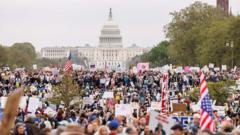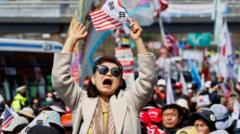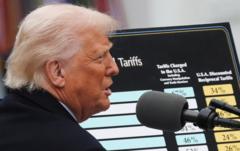In a significant ruling, South Korea's Constitutional Court upheld the impeachment of President Yoon Suk Yeol on April 4, 2025, leading to his immediate removal from office. This verdict arrived just four months after Yoon’s brief, controversial imposition of martial law on December 3, an action that divided the nation and spurred massive public outcry.
South Korea's Constitutional Court Removes President Yoon Suk Yeol from Office

South Korea's Constitutional Court Removes President Yoon Suk Yeol from Office
Yoon's impeachment followed a controversial martial law declaration that lasted only hours, sparking nationwide protests.
The decision sparked spontaneous celebrations among protesters who had long demanded Yoon's ouster. As the ruling was announced by Acting Chief Justice Moon Hyungbae, throngs of demonstrators in Seoul erupted in cheers, brandishing flags and celebrating what they viewed as a victory for democracy. The court had spent months deliberating Yoon's fate after his administration's actions drew heavy scrutiny and criticism.
On the day of the ruling, Justice Moon stated that the impeachment was a result of Yoon "betraying the trust of the people" and "severely violating the law." The integrity of the ruling body was reaffirmed when it revealed that all eight justices concurred with the decision, emphasizing that the impeachment cannot be appealed.
The controversy began with Yoon's alarming declaration of martial law, which was quickly overturned by the National Assembly after six hours. The situation escalated when troops, allegedly dispatched by Yoon, stormed the assembly building in an attempt to prevent lawmakers from voting against the decree. Although the martial law order was short-lived, it triggered significant backlash from the public, leading to weeks of protests in freezing conditions, where citizens rallied for both support and opposition to the president.
Justice Moon highlighted that Yoon's justification for the martial law declaration—that a national crisis warranted such extreme measures—did not meet the constitutional requirements. With the ruling effective immediately, Yoon's political future appears bleak, marked by a resignation from the People Power Party acknowledging the court's decision.
This unprecedented ruling marks a pivotal moment in South Korea's democratic processes, highlighting the strength of judicial oversight in addressing executive overreach.
On the day of the ruling, Justice Moon stated that the impeachment was a result of Yoon "betraying the trust of the people" and "severely violating the law." The integrity of the ruling body was reaffirmed when it revealed that all eight justices concurred with the decision, emphasizing that the impeachment cannot be appealed.
The controversy began with Yoon's alarming declaration of martial law, which was quickly overturned by the National Assembly after six hours. The situation escalated when troops, allegedly dispatched by Yoon, stormed the assembly building in an attempt to prevent lawmakers from voting against the decree. Although the martial law order was short-lived, it triggered significant backlash from the public, leading to weeks of protests in freezing conditions, where citizens rallied for both support and opposition to the president.
Justice Moon highlighted that Yoon's justification for the martial law declaration—that a national crisis warranted such extreme measures—did not meet the constitutional requirements. With the ruling effective immediately, Yoon's political future appears bleak, marked by a resignation from the People Power Party acknowledging the court's decision.
This unprecedented ruling marks a pivotal moment in South Korea's democratic processes, highlighting the strength of judicial oversight in addressing executive overreach.



















